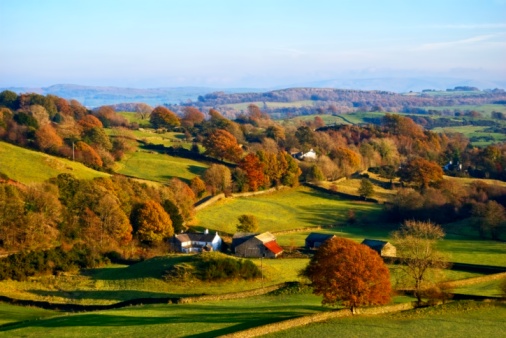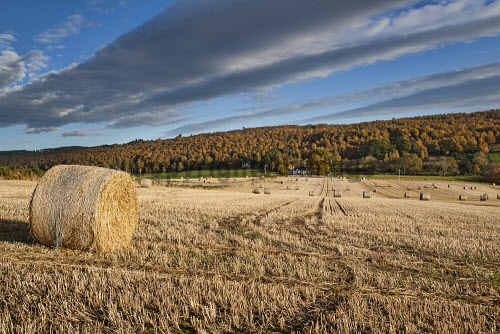《最后的诗歌》:40: 不用在此告诉我,无须多言
《最后的诗歌》
XL
第四十首
不用在此告诉我,无须多言
Tell Me Not Here, It Needs Not Saying
英国 A. E. 豪斯曼原著
Alfred Edward Housman (1859 – 1936)
徐家祯翻译

Tell me not here, it needs not saying,
What tune the enchantress plays
In aftermaths of soft September
Or under blanching mays,
For she and I were long acquainted
And I knew all her ways.
On russet floors, by waters idle,
The pine lets fall its cone;
The cuckoo shouts all day at nothing
In leafy dells alone;
And traveller’s joy beguiles in autumn
Hearts that have lost their own.
On acres of the seeded grasses
The changing burnish heaves;
Or marshalled under moons of harvest
Stand still all night the sheaves;
Or beeches strip in storms for winter
And stain the wind with leaves.
Possess, as I possessed a season,
The countries I resign,
Where over elmy plains the highway
Would mount the hills and shine,
And full of shade the pillared forest
Would murmur and be mine.
For nature, heartless, witless nature,
Will neither care nor know
What stranger’s feet may find the meadow
And trespass there and go,
Nor ask amid the dews of morning
If they are mine or no.
不用在此告诉我,无须多言,
那仙女在将什么乐曲奏演,
在九月柔软的再生草丛里,
或在漂白的山楂树下面。
她与我早已相识多年,
我知道她所有的手段。
黄叶铺地,流水潺潺, 松树任松果自由落地, 杜鹃在树木葱郁的山谷, 整天独自啼唱毫无目的; 秋天的铁线莲花, 迷惑人心让人忘乎所以。
大片已结籽的草原,
金光闪闪随风起伏不已;
捆扎的谷物在丰收的月光下,
整夜肃立田间整整齐齐;
山毛榉被冬天的风暴吹刮,
片片树叶夹在风中飞起。
拥有了一个季节,
就拥有我已离开的乡间,
那儿有榆树覆盖的平原,
闪亮的公路在山间盘旋,
大树参天、浓荫密布,
枝叶喃喃,一切都任我独占。
对自然而言,既无智慧,亦无情操,
既不关心也不知道,
哪位陌生人的脚步会找到牧场,
并在草地上漫步逍遥;
也不会问早晨晶莹的露珠,
是我的,还是谁人的财宝。
二 0 二二年五月二十四日
译于澳大利亚刻来佛寺爱闲堂
* 豪斯曼的这首诗是诗集《最后的诗歌》中的第 40 首。
这是一首赞美秋天美丽的大自然景色的诗歌。在诗的第一节,诗人把“自然”比 作一个“仙女”,她在演奏秋的乐曲。还说“她与我已经相识多年”,所以已经知道“她 所有的手段”。
诗的第二节到第四节,详细描写了英国乡间秋季之美。在第四节的最后一句, 诗人说:这“一切都任我独占”。这句话,进一步解释了第一节说的: 因为他与自然“早 已相识多年”,所以,可以与大自然交流沟通,甚至把她作为可以“独占”的挚友。
但是紧接的第五句却作了一个转折,说“对自然而言,(它是)既无智慧,也无 情操”的事物,所以,根本不会关心谁会走进牧场,或者谁拥有露水。于是,人之所以 感到与大自然的亲近,那只是人自己单方面的感觉罢了。在中国,也有“草木无心”或 “草木无情”的说法,诗的最后一节也就是这个意思。
在第二节有一个词“traveller’s joy”,不是指的人,而是一种花的俗称。是中文叫 “铁线莲”的这种花的一个品种。
全诗共五节,每节六句。译诗每节双句押一韵。
